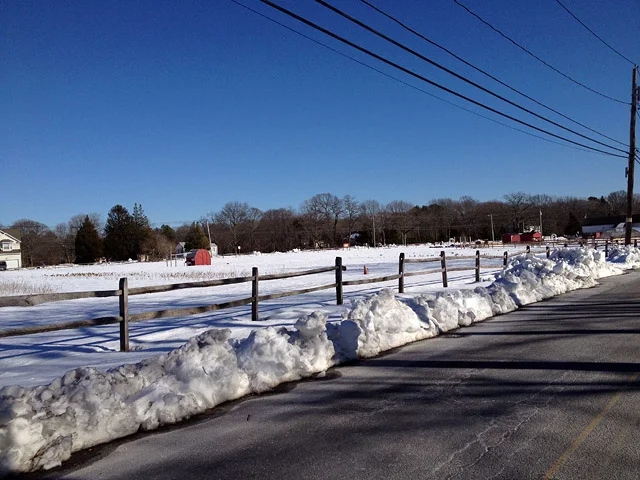Memory Lane
After a short visit to the garlic farm last week I finally had time to head to my old neighborhood. I wanted to know what has happened to what anyone I grew up with would simply have called the farm.
I was relieved to see that the triangle wasn't filled with new, plastic-sided homes, but something was different.
I rounded the pointy tip, the most acute corner I know, to read the sign which did its level best to explain. Hobbs farm, I had now recollected the name, was no longer in the family.
The old barn had me thinking a church was involved. I could see that there was a a segmented garden -maybe a community-type plot.
And so I left it, glad to see the farm was still there, but sure that it was no longer as before. And since I was but a half mile from my childhood home, I decided to pass on by to see how it has changed since my mother was forced to sell it as part of her divorce settlement.
Maybe there is a German word for the feeling one gets when they see the shape of their childhood house dressed in different clothing. I know those oak trees like I know the back of my hand, I can walk around them in my mind, isolating lichens and patterns of bark. I know the scent of the thin soil, the patches where only moss will grow, the colonies of black ants. I do not know those cars, or those new shrubs, or how they've changed the orientation of the drive. I don't know who is inside my room.
On our road, we lived at the pinnacle of what we called a hill. The drainage was poor here, so that after heavy rains, a large puddle would form. It seemed that all the town could do was to place what we called cannon balls on either side of the pond. I was fascinated by these sooty black orbs with flame atop. I cannot believe I never tried to take one home (or did I?). Standing water was not common to our stretch of the woods, so I was also in love with these puddles, several inches deep, which we had to skirt by passing through the yards in order to get to or from our bus stop. I was disappointed when a formidable puddle in the morning had drained by the end of a school day.
To the left I jumped a ramp on my bike and went over the handle bars. To the right I passed through at night, jumping the fence to get to friends. This is where we trick or treated until we switched to eggs. The house at the top of the hill, on the left, belonged to a man who burnt his trash. The house on the top to the right had a free-roaming dog named Randy who always managed to visit our barbecues. The house at the top belonged to a man who died in his driveway as he worked his chainsaw on trees fallen by hurricane Gloria.
Just a few doors down, behind this house, I rode my first horse. Led by a brunette in riding pants and boots, three times around, it cost only a dime. I may have been five or six.








Nice, Frank.
ReplyDeleteThanks for stopping by. Mr. Hobbs is worth a story -born 1906.
DeleteNice Frankie :)
ReplyDeleteNice Frankie :)
ReplyDelete